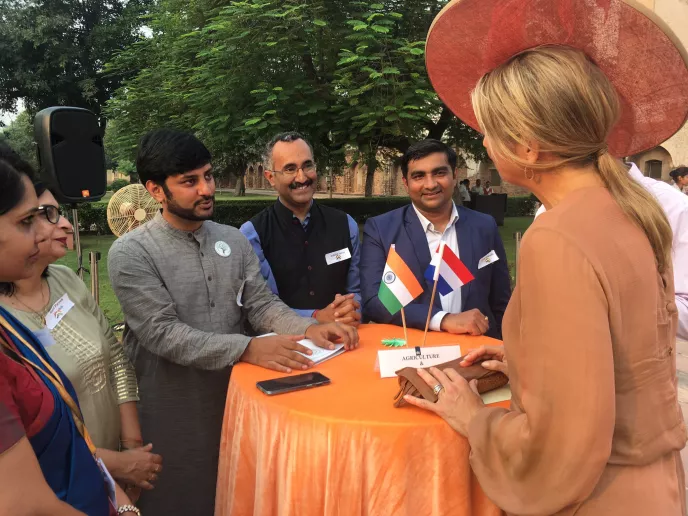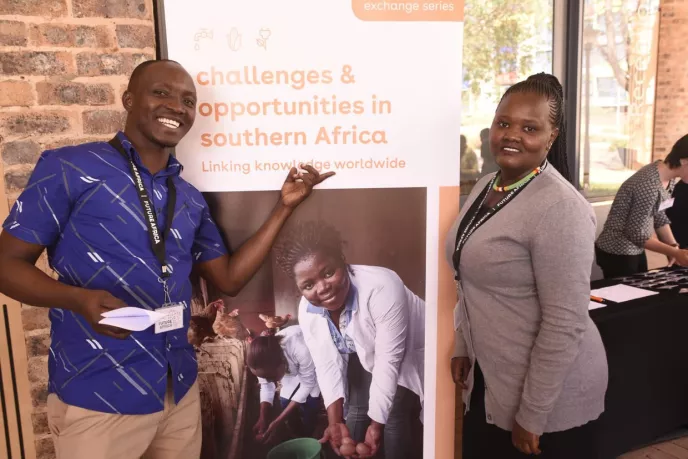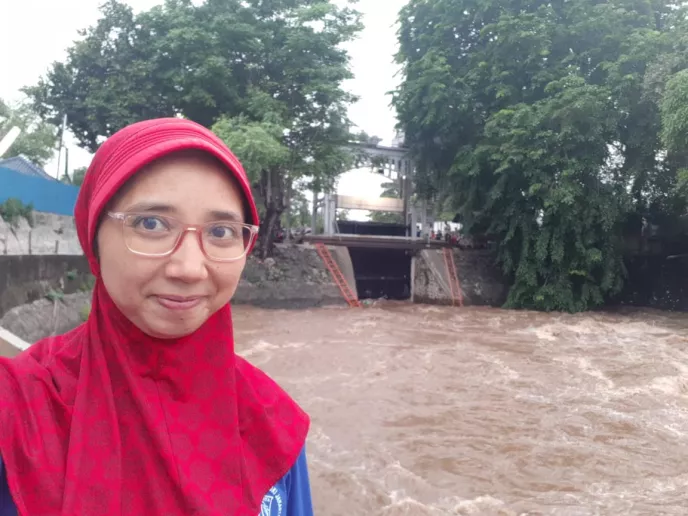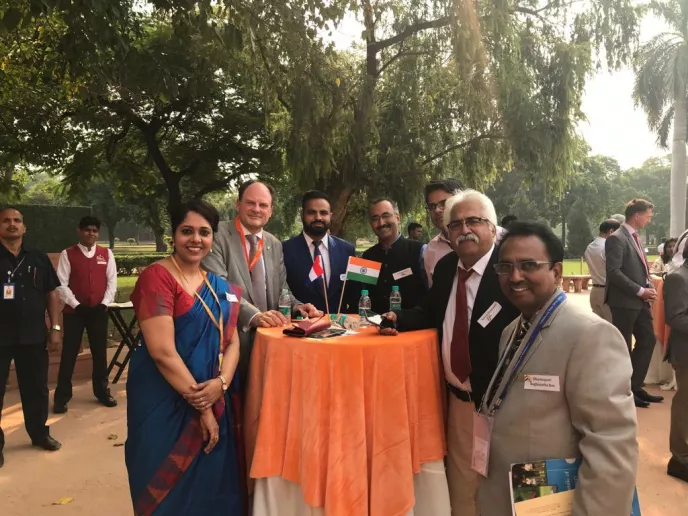Knowledge diplomacy: the centrepiece of trade
State visits garner a lot of attention in media circles and business communities. And rightly so: the visiting country or region brings along political leaders, their best and brightest entrepreneurs, and leaders from the field of education and research. In a span of just a few days the visiting as well as the hosting country showcase the very best they have to offer.
Yet beyond the buzz that accompanies high-profile international state visits and trade missions, other forms of diplomacy are also leaving their mark. Knowledge diplomacy is a prime example. Its activities – like student exchange, development programmes, Holland Alumni events – are often characterised by long-term relationships and investments. They may not make the frontpages of newspapers, but nevertheless have an enormous impact on the people, countries and regions involved.
Quiet diplomacy
That is why Sigrid Kaag, Minister for Foreign Trade and Development Cooperation, once called Nuffic’s Orange Knowledge Programme “a quiet channel for public international diplomacy”. Nuffic is working to maximise the benefits of its knowledge diplomacy initiatives, both for developing countries as well as the Netherlands itself.


"We need international partnerships and science. We need the sharing of experience and expertise."
Mutual benefits and reciprocity were central to the first-ever Orange Knowledge exchange series last September in Pretoria, South Africa. A total of 63 people who studied in the Netherlands (hailing from five different countries in southern Africa) gathered for three days to share ideas and discuss sustainable development and cross-border environmental challenges. The attendees were members of Nuffic’s Holland Alumni network.
Goal of this event was to create a regional platform to develop capacity in selected thematic areas (food, water & energy) and to stimulate collaboration between alumni, sector specific stakeholders, knowledge institutions and governmental bodies.
Solving global challenges together
“This event was a perfect example that if we, as a planet, are successfully going to address the many shared societal challenges we face, we need international partnerships and science,” said Daan du Toit of the South African Department of Science and Innovation. “We need the sharing of experience and expertise.”
“The Orange Knowledge exchange series is about solving global challenges together,” says Karen de Man, Communications advisor Team Alumni & Career at Nuffic. “Alumni events ensure that it doesn’t end with a study in the Netherlands. We support the 70,000-strong Holland Alumni network in finding ways to make their knowledge gained in the Netherlands applicable in their own countries.”
"The experience at Delfland in the Netherlands really opened my eyes." - Ika Agustin Ningrum, Flood Management Department, Jakarta

Staying in touch with the Dutch
Holland Alumna Ika Agustin Ningrum does just that. Ningrum participated in the Dutch Training & Exposure Programme (DUTEP) in 2015. She conducted a 10-week research internship at Waterboard Delfland, where she received coaching from Rotterdam University of Applied Sciences. Today, she heads the Flood Management Department of the Water Resource Agency in Jakarta, Indonesia.
"Jakarta, like the Netherlands, is under sea level and recently experienced mass floodings," Ningrum says. “At Delfland I learned so much about pumping station operations, flood control systems and maintenance. I saw how people in the Netherlands had to change their mindset about water and build natural-structured flood control systems. The experience really opened my eyes: how can we manage the water in Jakarta in a way that it becomes a great resource for the city, rather than a threat.”
Nuffic & Indonesia
Ever since Nuffic started back in 1950, Indonesia has been part of its Global Development programmes, most funded by the Netherlands’ Ministry of Foreign Affairs. In the last decade only, more than 20 institutional collaboration projects were funded through these programmes. In these multi-annual projects, Dutch and Indonesian knowledge institutes aim to strengthen educational institutions and other key organisations.
The focus for Indonesia in all these capacity building projects is on water management, security and rule of law, and private sector development. Reciprocity and complementarity are key to these projects, which means both countries benefit from knowledge exchange. Currently 4 projects are running till the end of 2021.
Ningrum says she hopes to return to the Netherlands one day. By staying in touch with Holland Alumni, and organising events like the exchange series, Nuffic keeps alumni’s ties to the Netherlands strong. “Often, Holland Alumni end up working in government or they become business leaders,” De Man says. “This can open doors for Dutch government and businesses.”
"Holland Alumni are so passionate about the Netherlands. They promote the Netherlands more than we do!"
Passionate about the Netherlands
This is especially true since ‘quiet diplomacy’ sometimes leads to loud and clear advocacy. De Man: “Holland Alumni become ambassadors of the Netherlands”.
Anwesha Majumder, Chief Representative of Nuffic Neso India, agrees. “Holland Alumni are so passionate about the Netherlands”, she exclaims, jokingly adding: “They promote the Netherlands more than we do!”
Majumder knows what she is talking about. Last year, her office brought together a group of Indian Holland Alumni for the state visit of His Majesty King Willem-Alexander and Her Majesty Queen Máxima. During a 'business mixer', Indian alumni met with representatives of Dutch businesses, and they had talks with the King and Queen.
Their strong bond with the Netherlands was on display as familiarity and positivity ruled the day, and several ‘matches’ for future collaborations were made.
Several ‘matches’ for future collaborations were made during a business-mixer in India

Knowledge leads to innovation
This example also shows that knowledge diplomacy is by no means a stand-alone practice, as it takes its rightful place within state visits and economic missions as well. In fact, it adds a crucial element, according to Nanya Burki, Head of Development & Partnerships at Nuffic Neso Indonesia. “Knowledge leads to innovation, and innovation leads to trade. Knowledge and education cannot be separated from economics, it’s a prerequisite.”
It is a message Burki hopes to convey clearly this March when a large Dutch economic mission will visit Indonesia. “As the relationship between our countries is developing – with Indonesia moving towards an upper-middle income country and the Netherlands phasing out development aid – we hope to achieve an even greater engagement in education, research and innovation. This way, we develop a mutually beneficial relationship between both countries.”
To give this journey an extra boost, Nuffic Neso Indonesia will organise a special week called WINNER: the Week of Indonesia – Netherlands Education and Research. It will be held in June 2020 and focus on the theme ‘Achieving the SDGs: from Knowledge to Practice’.
"Knowledge and education cannot be separated from economics, it’s a prerequisite.”
Strengthening bilateral relations
Events like these are vital since knowledge diplomacy goes a step further than internationalisation, Majumder says.
“Internationalisation is limited to student exchange and academic collaboration, which leads to knowledge exchange and educational collaborations. Knowledge diplomacy on the other hand is about strengthening bilateral or multilateral relations among countries with a focus on addressing global challenges through research and knowledge exchange. Often together with government, NGOs, education institutes, civil society and multinationals.”
In the eyes of Majumder, education does not always automatically gets the respect it deserves. “In trade missions, participants don’t always think about education. On a recent agricultural mission to Bangalore, I insisted on not only visiting businesses, but the agricultural institute at the university as well. Because let’s be clear on this: knowledge is the centrepiece of trade.”
Facts & figures Orange Knowledge Programme exchange series
The Orange Knowledge Programme exchange series connects professionals who studied in the Netherlands. During these regional events, attendees share ideas in selected thematic areas. The attendees are mostly members of Nuffic’s Holland Alumni network, who meet with sector specific stakeholders, knowledge institutions and governmental bodies. Two events have been held thusfar:
South Africa, 3-5 September, 2019
- 19 participants from Zimbabwe, 17 from Tanzania, 15 from South Africa, 7 from Zambia and 5 from Mozambique.
- Themes: Water Management, Energy & Food Security
Bangkok, 20-22 November, 2019
- 14 participants from Thailand, 12 from Bangladesh, 12 from the Philippines, 11 from Myanmar, 10 from Vietnam, 6 from Indonesia and 3 from Cambodia.
- Themes: Water Management & Food Security